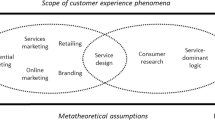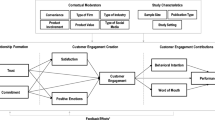Abstract
Although a potentially significant issue to managers and academics alike, opportunistic customer behavior in the service recovery context has been largely ignored. A multi-stage research program, comprising actual customer claims (Study 1), in depth customer interviews (Study 2) and three experimental studies (Studies 3, 4, 5), explored opportunistic customer claiming behavior during service recovery and yielded robust findings across methods, contexts and samples. Potential determinants of opportunistic claiming in a service recovery context were identified by drawing on the justice, self-concept maintenance and neutralization theories. The findings support the hypothesis that when experiencing lower distributive, procedural and interactional justice, respondents were more likely to be opportunistic in their claiming. Furthermore, consumers were more likely to be opportunistic when dealing with large compared to small firms, and when they were in one-time transactions compared to when they had an established relationship with the firm. Finally, increased claiming in general, and opportunistic claiming in particular, did not lead to increased satisfaction with the service recovery.


Similar content being viewed by others
Notes
We report the age category of the respondent wherever it was available. Not all respondents ticked the age category box on the claim form.
Actual names in quotes of Studies 1 and 2 and of respondents in Study 2 have been changed to protect their identities, and only pseudonyms are used.
References
Accenture Inc. (2003). One-fourth of Americans say it’s acceptable to defraud insurance companies, Accenture survey finds. Press release. Retrieved April 10, 2008 from http://newsroom.accenture.com/article_display.cfm?article_id=3970.
Ambrose, M. L., Seabright, M. A., & Schminke, M. (2002). Sabotage in the workplace: the role of organizational justice. Organizational Behavior and Human Decision Processes, 89, 947–965.
Babcock, L., & Loewenstein, G. (1997). Explaining bargaining impasse: the role of self-serving biases. Journal of Economic Perspective, 11(1), 109–126.
Baron, R. M., & Kenny, D. A. (1986). The moderator-mediator variable distinction in social psychological research: conceptual, strategic, and statistical considerations. Journal of Personality and Social Psychology, 51(6), 1173–1182.
Berry, L. L., & Seiders, K. (2008). Serving unfair customers. Business Horizons, 51, 29–37.
Bettencourt, L. A. (1997). Customer voluntary performance: customers as partners in service delivery. Journal of Retailing, 73(3), 383–406.
Blodgett, J. G., Hill, D. J., & Tax, S. (1997). The effects of distributive, procedural, and interactional justice on post-complaint behavior. Journal of Retailing, 73(2), 185–210.
Christie, R., & Geis, F. L. (1970). Studies in machiavellianism. New York: Academic.
Chu, W., Gerstner, E., & Hess, J. D. (1998). Managing dissatisfaction: how to decrease customer opportunism by partial refunds. Journal of Service Research, 1(2), 140–55.
Cox, A. D., Cox, D., Anderson, R. D., & Moschis, G. P. (1993). Social influences on adolescent shoplifting—theory, evidence, and implications for the retail industry. Journal of Retailing, 69(2), 234–246.
Doney, P. M., & Cannon, J. P. (1997). An examination of the nature of trust in buyer-seller relationships. Journal of Marketing, 61(2), 35–51.
Fisk, R., Grove, S., Harris, L. C., Keeffe, D., Reynolds, K. L., Russell-Bennett, R., Wirtz, J. (2010, forthcoming). Customers behaving badly: A state of the art review, research agenda and implications for practitioners. Journal of Services Marketing.
Frey, B. F. (2000). The impact of moral intensity on decision making in a business context. Journal of Business Ethics, 26(3), 181–195.
Fullerton, R. A., & Punj, G. (2004). Repercussions of promoting an ideology of consumption: consumer misbehavior. Journal of Business Research, 5, 1239–1249.
Gilmore, A., Carson, D., & O’Donnell, A. (2004). Small business owner-managers and their attitudes to risk. Marketing Intelligence & Planning, 22(2/3), 349–360.
Gneezy, U. (2005). Deception: the role of consequences. American Economic Review, 95, 384–394.
Goodwin, C., & Ross, I. (1992). Consumer responses to service failures: influence of procedural and interactional fairness perceptions. Journal of Business Research, 25(2), 149–163.
Greenberg, J. (1990). Employee theft as a reaction to underpayment inequity: the hidden cost of pay cuts. Journal of Applied Psychology, 75(5), 561–68.
Grover, S. L., & Hui, C. (1994). The influence of role conflict and self interest on lying in organizations. Journal of Business Ethics, 13(4), 295–303.
Harris, L. C. (2008). Fraudulent return proclivity: an empirical analysis. Journal of Retailing, 84, 461–476.
Harris, L. C., & Reynolds, K. L. (2003). The consequences of dysfunctional customer behavior. Journal of Service Research, 6(2), 144–161.
Harris, L. C., & Reynolds, K. L. (2004). Jaycustomer behavior: an exploration of types and motives in the hospitality industry. Journal of Services Marketing, 18(5), 339–357.
Hayes, R. R., Jr. (1996). Selling the concept of loss prevention. Security Management, 40(12), 53–57.
Herman, T. (2005). Study suggests tax cheating is on the rise; Most detailed survey in 15 years finds $250 billion-plus gap; Ramping up audits on wealthy. The Wall Street Journal, p. D1.
Johnston, T. C., & Hewa, M. A. (1997). Fixing service failures. Industrial Marketing Management, 26(5), 467–473.
Jones, T. M. (1991). Ethical decision making by individuals in organizations: an issue contingent model. Academy of Management Review, 16(2), 366–395.
Karande, K., Magnini, V. P., & Tam, L. (2007). Recovery voice and satisfaction after service failure: an experimental investigation of mediating and moderating factors. Journal of Service Research, 10(2), 187–203.
Keaveney, S. M. (1995). Consumer switching behavior in service industries: an exploratory study. Journal of Marketing, 59(2), 71–82.
Lovelock, C. (1994). Product plus: how product + service = competitive advantage. New York: McGraw-Hill.
Lovelock, C., & Wirtz, J. (2007). Services marketing—people, technology, strategy (6th ed.). Upper Saddle River, New Jersey: Prentice Hall.
Mazar, N., & Ariely, D. (2006). Dishonesty in everyday life and its policy implications. Journal of Public Policy & Marketing, 25(1), 117–126.
Mazar, N., Amir, O., & Ariely, D. (2008a). The dishonesty of honest people: the theory of self-concept maintenance. Journal of Marketing Research, 45(6), 633–644.
Mazar, N., Amir, O., & Ariely, D. (2008b). More ways to cheat—expanding the scope of dishonesty. Journal of Marketing Research, 45(6), 651–653.
McColl-Kennedy, J. R., Patterson, P. G., Smith, A. K., & Brady, M. K. (2009). Customer rage episodes: emotions, expressions and behaviors. Journal of Retailing, 85(2), 222–237.
Monterosso, J. R., & Langleben, D. D. (2008). “Homo economicus’ soul.” Commentary to “The dishonesty of honest people” by Mazar, Amir & Ariely. Journal of Marketing Research, 45(6), 648–650.
Muncy, J. A., & Vitell, S. J. (1992). Consumer ethics: an investigation of the ethical benefits of the final customer. Journal of Business Research, 24(4), 297–311.
Oliver, R. L., & Swan, J. E. (1989). Consumer perception of interpersonal equity and satisfaction in transactions. A field survey approach. Journal of Marketing, 53(2), 21–35.
Paternoster, R., & Simpson, S. (1996). Sanction threats and appeals to morality: testing a rational choice model of corporate crime. Law and Society Review, 30(3), 549–583.
Ping, R. A., Jr. (1993). The effect of satisfaction and structural constraints on retailer exiting, voice, loyalty, opportunism, and neglect. Journal of Retailing, 69(3), 320–352.
Rahim, M. A. (1983). A measure of styles of handling interpersonal conflict. Academy of Management Journal, 26, 368–376.
Reynolds, K. L., & Harris, L. C. (2005). When service failure is not service failure: an exploration of the forms and motives of “illegitimate” customer complaining. Journal of Services Marketing, 19(5), 321–335.
Sackeim, H. A., & Gur, R. C. (1979). Self-deception, other deception and self-reported psychopathology. Journal of Consulting and Clinical Psychology, 47, 213–215.
Salamon, S. D., & Robinson, S. L. (2002). Does trust climate deter workplace deviance? An organizational level analysis. Paper presented at the annual meeting of the Academy of Management. Denver, CO.
Schwartz, S. H., & Howard, J. A. (1980). Explanations of the moderating effect of responsibility denial on the personal norm-behavior relationship. Social Psychology Quarterly, 43(4), 441–446.
Smith, A. K., & Bolton, R. N. (2002). The effect of customers’ emotional responses to service failures on their recovery effort evaluations and satisfaction judgments. Journal of the Academy of Marketing Science, 30(1), 5–23.
Smith, A. K., Bolton, R. N., & Wagner, J. (1999). A model of customer satisfaction with service encounters involving failure and recovery. Journal of Marketing Research, 36(3), 356–372.
Sparks, B. A., & McColl-Kennedy, J. R. (2001). Justice strategy options for increased customer satisfaction in a services recovery setting. Journal of Business Research, 54, 209–218.
Stone, G. (1954). City shoppers and urban identification: observations on the social psychology of city life. American Journal of Sociology, 60, 36–45.
Strutton, D., Vitell, S. J., & Pelton, L. E. (1994). How consumers may justify inappropriate behavior in market settings: an application on the techniques of neutralization. Journal of Business Research, 30(3), 253–260.
Sykes, G. M., & Matza, D. (1957). Techniques of neutralization: a theory of delinquency. American Sociological Review, 22(6), 664–670.
Tax, S. S., & Brown, S. W. (1998). Recovering and learning from service failure. MIT Sloan Management Review, 40(1), 75–88.
Tax, S. S., Brown, S. W., & Chandrashekaran, M. (1998). Customer evaluations of service complaint experiences: implications for relationship marketing. Journal of Marketing, 62(2), 60–76.
Thio, A. (2004). Deviant behavior (7th ed.). Boston: Allyn & Bacon.
Trivers, R. (2000). The elements of a scientific theory of self-deception. In P. Moller & D. LeCroy (Eds.), Evolutionary perspectives on human reproductive behavior (pp. 114–131). New York: New York Academy of Sciences.
Voorhees, C. M., & Brady, M. K. (2005). A service perspective on the driver of complaint intentions. Journal of Service Research, 8(2), 192–204.
Wirtz, J., & Bateson, J. E. G. (1999). Consumer satisfaction with services: integrating the environmental perspective in services marketing into the traditional disconfirmation paradigm. Journal of Business Research, 44(1), 55–66.
Wirtz, J., & Kum, D. (2004). Consumer cheating on service guarantees. Journal of the Academy of Marketing Science, 32(2), 159–175.
Wirtz, J., & Mattila, A. (2004). Consumer responses to compensation, speed of recovery and apology after a service failure. International Journal of Service Industry Management, 15(2), 150–166.
Young, L. C., & Wilkinson, I. F. (1989). The role of trust and co-operation in marketing channels: a preliminary study. European Journal of Marketing, 23(2), 109–122.
Author information
Authors and Affiliations
Corresponding author
Rights and permissions
About this article
Cite this article
Wirtz, J., McColl-Kennedy, J.R. Opportunistic customer claiming during service recovery. J. of the Acad. Mark. Sci. 38, 654–675 (2010). https://doi.org/10.1007/s11747-009-0177-6
Received:
Accepted:
Published:
Issue Date:
DOI: https://doi.org/10.1007/s11747-009-0177-6




